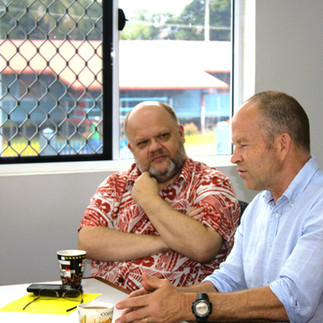Bridging Gaps in the Taro Value Chain: Field Visit to Markham Valley Spotlights Farmers' Voices
- Jul 9, 2025
- 3 min read

On April 8th, Grow PNG facilitated a significant field visit to Mutzing Station in the Markham Valley, bringing together key stakeholders from the agriculture sector to strengthen the region's taro value chain. The delegation included representatives from Sprout Economics, namely Robert and Roel, alongside Nic Johnson, Councillor for Economics, and Benjamin Hogen, Assistant Program Manager for Economics, from the Australian High Commission in Port Moresby.
The objective of the trip was to engage directly with smallholder farmers in the valley, listening to their lived experiences in taro farming and understanding the barriers they face. It also provided an opportunity for partners to assess how these insights could contribute to the development of a more enabling taro value chain through the Markham District Development Authority (MDDA) and Grow PNG’s agribusiness network, including potential exporters.
Roundtable Dialogue: Farmers and Partners in Conversation
The visit commenced at the MDDA conference room with a vibrant roundtable dialogue that brought together farmer representatives, district officials from economic and rural development sectors, women’s empowerment advocates, and development partners.
John Yamin, President of the Markham Food Cooperative Society and lead farmer, set the tone by sharing the challenges and aspirations of local farmers:
“We’re not just growing food, we’re growing opportunities. But access to proper markets and infrastructure remains a big barrier,” said John Yamin, president of Markham Food Cooperative Society.
District officials echoed the need for deeper collaboration with development partners and the private sector. The discussion highlighted the importance of improving farmer training, input access, and aligning value chain actors for greater productivity.
Nic Johnson from the Australian High Commission commended the initiative and emphasized Australia's interest in supporting inclusive economic development:
“Hearing directly from farmers gives us clarity on where support is most needed. These dialogues help shape practical solutions,” Johnson remarked during the discussion.
Sprout Economics consultants, working closely with Grow PNG, presented early insights from their ongoing value chain analysis and reaffirmed the potential for taro export development if systemic bottlenecks are addressed.
A Warm Field Welcome: Learning from the Ground
Following the roundtable, the group travelled to John Yamin’s farm, where a warm traditional welcome was extended by women members of the cooperative—who make up 80% of its farming base. Their cultural hospitality set a powerful tone for the field engagement.
Walking through taro plots and engaging in direct conversations, the visitors gained a deeper understanding of the daily realities and constraints faced by local farmers. Farmers shared insights into traditional practices, pest and disease challenges, the need for training in grading and post-harvest handling, and their hope for consistent buyer arrangements.
One of the women farmers, expressed her perspective with pride and conviction:

“We know how to plant. We know how to grow. What we need now is for someone to believe in our crop and take it to the market,” she said, guiding the group through her taro garden.
The field visit ended with a brief reflection session, where stakeholders committed to working more closely with the Markham District and Grow PNG to explore viable investment and market opportunities for taro, including formalizing pathways for potential export.
Looking Ahead: From Listening to Action
Grow PNG’s facilitation of the visit served as a bridge between local farmers and national and international partners, ensuring that policy decisions and development investments are rooted in farmer realities.
“This kind of field-based engagement is what unlocks meaningful development. We look forward to co-designing initiatives that bring the taro value chain to life,” said Roel from Sprout Economics, closing the day’s activities.
With momentum building and partnerships strengthening, the next steps will focus on value chain coordination, capacity-building for farmers, and linking cooperatives to buyers and export partners—turning stories of challenge into success.





